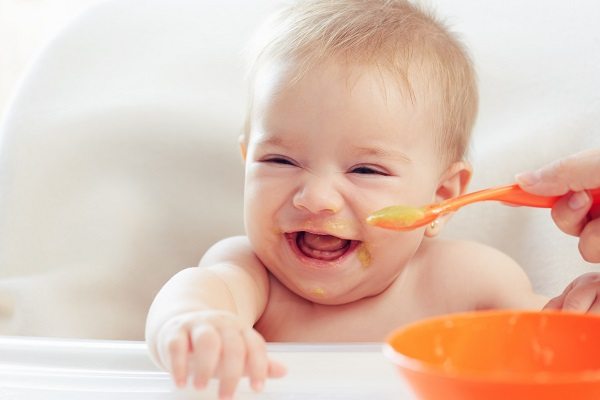If your small baby is starting to grumble after feeding, or imitating your mouth when you’re surreptitiously downing some porridge before your morning walk, then they might be getting ready for some solid food. The Food Safety Authority says to wean babies as close to six months as possible, and no sooner than 16 weeks. But of course, every baby is different and ultimately you know what’s best for your baby, especially when it comes to feeding them. If in doubt, your public health nurse is a great source of advice when it comes to feeding and weaning.
The question when you start to move towards solid food is: do you go for the store-bought, pre-made option or do you cook your own? Many packaged foods are cooked at extremely high temperatures to to extend their shelf life and this gets rid of a lot of natural flavour and nutrients in the food. Preservatives, salt and sugar may also be added to the food and we’re not sure how much of that stuff we want in our little guys’ stomachs. But the added prep and cooking time doesn’t suit busy lifestyles, and let’s be honest, parents are busy enough these days. So what is the better option?
Making your own
Pros
- You can avoid salt and sugar completely when you make your own baby food. If you’re worried your baby won’t enjoy the flavour of fruit and vegetables, add in different seasonings like garlic powder, cinnamon and pepper.
- If you like to cook, it’s an extension of what you already do in the kitchen.
- As your child gets used to solid foods, you can change the settings on your food processor to create a chunkier puree as opposed to a smooth watery puree for younger children.
- You can create a lot of different options, rather than relying on store bought options.
Cons
- You may need a bigger freezer.
- It can be time consuming.
- You have to buy the raw ingredients.
- If your child doesn’t like your combo, then you have a lot of pureed food that goes to waste.
There is, of course, a happy medium here. You can always prepare most of your baby’s food yourself for when you’re at home, but keep a few jars of the store bought stuff in case you have to give them something on the go.
If you decide to make some baby food at home, here are some of our favourite combos:
- Avocado and banana puree
- Broccoli and chicken puree
- Mixed veg puree (carrot, potato and parsnip is a nice combination)
- Apple and pear puree
- Beetroot and berry puree
- Sweet potato and carrot puree
- Baked apple and apricot puree
- Courgette, mint and pea puree
DIY: Basic baby food
- Prepare your fruit or vegetables by washing them in water and chopping them into bite-sized pieces.
- Steam, bake or boil your firm fruit or vegetables (for example carrots, apples, squash, and sweet potato).
- Toss the cooked fruit or vegetables into your machine for pureeing, or into a bowl if you’re going to do it by hand with a potato masher or mixer.
- Set your machine to puree and away you go!
- Add some of the cooking water (but not carrot cooking water*), breast milk or formula to thin out the puree as needed.
- Baby food keeps in the fridge for up to 72 hours, but can be frozen for up to one month (an ice cube tray is ideal for home freezing and defrosting as you can easily measure portion size).
*Nitrate poisoning shouldn’t be a problem for your baby after they’re three months old. By the age of six months, your baby’s stomach will produce acid that kills off the bacteria that causes nitrates to convert into harmful nitrites.
Not sure if your baby is ready for weaning? Check out the signs here!
maternity&infant
Originally posted 2017-01-26 09:56:40.
